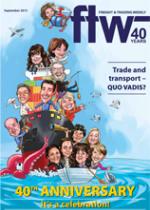Change is the only constant
in the clearing and
forwarding industry, says
operations director of
CargoCare Freight Services, Sue
Wood.
“While some developments have
fallen upon us with shocking speed,
such as the introduction of import
VAT collection in 1991, others have
come much more gradually – such
as the improvement from handwritten
bill of entry submissions to
the fully electronic transactions of
today.”
But for Wood the most
noteworthy development is not an
operational or statutory change but
an approach to the fundamentals of
the clearing and forwarding agent’s
entire business model.
“Given the challenges posed by
Sars modernisation as well as the
increasing innovation demands of
supply chain developments, the
biggest development is the need to
reposition the hardest thing of all –
our own mind-set about the clearing
and forwarding business.
“Generally speaking when
systems and processes change it is
not an impossible
task to realign to
newly required
standards,”
Wood told
FTW. “However,
changing a
business’s raison
d’etre requires
an open and
enquiring
approach if one
is to stay in the
game.
“Do we fully grasp the reality
of the need to re-educate our staff
in order that they will possess
the necessary skills required five
years from now? Have we deeply
understood the impact of Sars
modernisation on our financial
business model? These questions
and others that will no doubt arise
as we move ahead, will increasingly
challenge our ingenuity to a point
where we can no
longer identify
a single major
development
that has stood
out for us – but a
continuous and
growing pressure
to remain
relevant.
My wish for
the future of
the logistics
chain is that it
continues to feature the professional
contribution of the clearing
and forwarding agent, having
now created the framework for
professionalisation to take place.
INSERT & CAPTION
We need to reposition the
hardest thing of all — our
own mind-set about the
clearing and forwarding
business.
– Sue Wood

